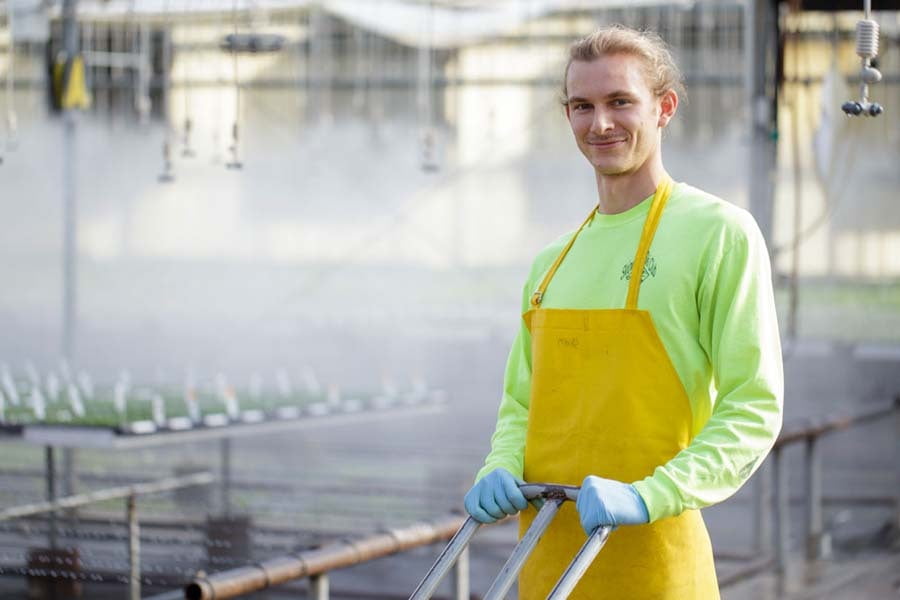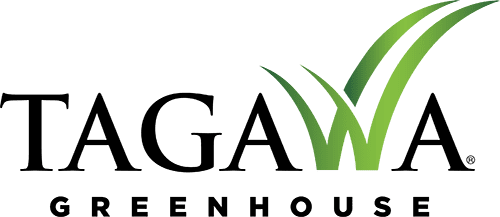

By: Tagawa Greenhouse Staff
June 5, 2021
We are pleased to announce that our 2020 Intern Sherman Hartman has been awarded the 2nd annual Paul Thomas Floriculture Production Intern of the Year Award!
Sherman has since been promoted to Grower at Tagawa Greenhouse and you can read about his intern experience below:
When I found out that I had received the opportunity to come to Colorado to study floriculture in Tagawa’s internship program, I was beyond excited. I wasn’t sure what I would get to see and take part in before entering the program. Having heard of this program and Tagawa’s reputation, I knew I would see some new areas within the greenhouse industry that I had not seen before, and also see some new species being grown in this production setting. It is safe to say that my expectations of this program were surpassed, despite COVID-19 and all. Even as an intern I felt I was a part of this special team here at Tagawa that truly does put people and relationships right up there with the plant quality.
I enjoyed the first rotation in operations for several reasons. It was exciting to be working with young, seemingly fragile cuttings and propagules at the Foothills location. I felt a bit like I was welcoming all of the boxes of cuttings into the facility and tucking them into the cooler before being stuck soon after. Later in that rotation I helped with a lot of sticking and jimmy-tagging. Following this order of receiving/unboxing cuttings, prepping for sticking, sticking cuttings, and finally pulling the finished trays to ship really gave me a sort of bird’s eye view to each order and tray, and how plant material arrives and finished orders leave the greenhouse with every step in between (besides the actual growing/production tasks). In this rotation, I learned the importance of organization whether it be good inventory practices to know where orders are being grown, or a good sticking line setup for efficiency.
Also, during this rotation I got to see first-hand just how versatile and flexible a greenhouse operation should be. From seeing management helping to fix sticking machines and tray filling equipment, to having employees switch over to hand sticking auto-stick cuttings in a pinch, this sort of versatility seems ingrained in this business dealing with live plants. That versatility was interesting to see in person; and was somewhat reinforced by the two-man teams constantly either building racks and moving around both empty racks and full racks of freshly stuck trays. It was those kinds of positions I had been overlooking in the industry, so it was great to take part in even if only briefly.
Following the operations rotation, I spend some time in production. I assisted in range D at the North facility, essentially as an irrigator but also helping out with and learning about other grower and general tasks too. I felt fairly confident in my irrigation abilities going into this rotation, but it turned out I got a chance to really focus that skill and others during my time there. It became utterly clear how important water quality is, and I assisted in testing our different water sources while the head grower was away for a couple weeks. I learned how to take into account dry down time, weather, fertilization needs, and general time management when planning out irrigations. Prior to this internship, I had tried to grow crops on the dry side with several small groups for assignments back in the campus greenhouse. After being shown the specifics and getting help fine tuning my irrigator’s judgment and watering hand, I found myself growing dryer more successfully and realizing that I never really had to a legitimate extent before. I got to see first-hand how certain cultural practices like moisture management and temperature from a plant’s early stages, can make all the difference in the final product of a nice full, toned plant.
One learning curve I was chasing for a short period of time was irrigating while taking into account the increasingly intense Colorado sun and heat during the spring months. Though I had a fair amount of moisture management experience in more humid climates, had never grown any plants in such an arid climate before being in production in range D. I believe it was mid-March when the temperatures and sun intensity began to rise beyond my anticipation leading to alarmingly fast dry down rates. I did not kill or really damage any plants during this time. Ashley instructed me to simply give more water to each container at each irrigation, and to walk my houses more frequently to ensure nothing gets too dry before I become aware of it. Even with that advice, it took me some time to adjust to these changing conditions. Nevertheless, this was an excellent learning opportunity for how one should take a holistic approach to plant care, including weather directly influencing irrigation practices. I deeply enjoyed this rotation because of the responsibility that lies upon the irrigator, and how one’s knowledge and good judgement can keep a crop on track to finish beautifully.
In my retail ready rotation, I got to spend time at a Costco, several Home Depots, and at the Tagawa Garden Center. These venues are different in how they sell their plants, the kinds of plants sold and containers, and generally the sort of customers that shop at these different places. At the Costco, I noticed most everything was in large containers and in pre-arranged designs, though there were other crops like various herbs, tomatoes, peppers, and succulents, and some 12-packs. These customers seemed least interested in the involvement with the plants and would rather prefer a large container in full bloom ready to enjoy. The Home Depot selection was much wider, with many different species in various packs, small pots, hanging baskets, and also large containers. These customers seemed excited about buying packs of annuals to plant themselves either in containers of their own or in their flowerbeds. Many people would buy a wide variety of plants for their home as well as other gardening equipment from the Home Depot.
While working at the Tagawa garden center, there were a variety of different customers. Some customers didn’t know a petunia from a canna, and others had specific questions regarding different species’ preferences, plant care, and remedies for insects or diseases. This facility carried the widest variety of crops among all three retail locations with different sections for annuals, roses, vegetables, houseplants, perennials, and a nursery section. The garden center had so many different species that it seemed rare that a customer’s request could not be fulfilled. No matter who the customer was, it was fun to gauge peoples plant knowledge to be able to assist them accordingly. At the Costco and Home Depots, there generally seemed to be two groups of customers, those who buy a container because of how it looks right now, and those who buy it for how they anticipate the arrangement to perform throughout its life. I enjoyed helping customers at all of these locations, though the Garden center likely taught me the most, as they essentially have experts in each of the different areas mentioned above.
During the Coronavirus outbreak, the world seemed to be a completely new arena with potential infection lurking around every turn. Though it was surely frightening, especially in the beginning when nobody knew very much for certain, the central point of my focus of the Covid-19 outbreak here is not the fear it invoked, but rather Tagawa’s handling of it. Early on during late February and March, I thought that Tagawa might close down even if only temporary. This did not happen for several reasons. Firstly, this company falls under the umbrella of Agriculture. Also, serious precautions were taken at all Tagawa facilities in attempt to reduce the spread including mandatory masks and social distancing, and rigorous sanitation across all facilities. Though a few individuals within the company did test positive, sufficient precautions were taken so that the company was able to stay open and operate near full capacity throughout.
By mid-March, masks were deemed mandatory at all Tagawa facilities and interfacility travel was drastically reduced. At the same time, the maintenance employees found new tasks of walking around and spraying commonly touched surfaces with disinfectant. Bottles of disinfectant were never out of sight, and the head of maintenance even sent me home with a couple to keep the house as clean as possible. When Colorado instituted a stay at home order, all employees were given a document proving that they were essential employees at an essential business, in case anyone was stopped by police. Some rules even changed so that those who might have contracted the virus could receive more paid sick days to deter anyone who might have it from spreading it further within the company. Though the fear continues to linger about contracting the virus, Tagawa seemed to do everything in their power to keep all employees safe. Despite the fact that it was in Tagawa’s best interest to take every precaution possible, I am deeply grateful to have been with a company who cares about their employees’ safety during such a volatile time.
After having completed the internship program, I feel much more floriculture oriented in my career outlook. My time spent in the greenhouse and in all areas of this company have helped me to be much more prepared for any position I may enter, especially those within green industries. From here I will take all I have learned and most likely enter a greenhouse production position within the year following my college graduation. This may likely begin with an irrigator position or as part of a team performing general greenhouse labor. Another area of horticulture I am considering is nursery crop production. No matter where I end up, this program will have surely aided my professional and intellectual development to help me get there and with my performance in any such position.
Overall, I enjoyed my time in the Tagawa Greenhouse internship program very much so. I learned more in these last 6 months than I thought I ever could. I found great pleasure learning about aspects of the greenhouse industry that I was previously unaware of. The program is set up in a way that allows interns to get a feel for the seasonal nature of the industry, as well as the ability to gain work experience in many different aspects of this business’s inter-workings. To say I am grateful for this opportunity, and my time here would be an understatement and I would sincerely recommend this internship program to all horticulture students interested in floriculture.



